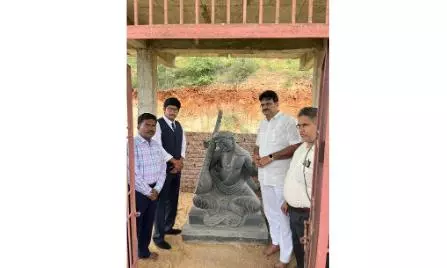
(From left) Tessy Thomas, Director General of Aeronautical Systems and Kalpana Kalahasthi, Associate Project Director for Chandrayaan –3 at a programme organised by Committee of FICCI Ladies Organization (FLO) in Hyderabad on April 5, 2024.
| Photo Credit: By Arrangement
India has a rich history of women scientists who have made significant contributions to the field of science. Two such stars from the galaxy – Tessy Thomas and Kalpana Kalahasthi– were in Hyderabad on Friday.
Dr. Thomas, also known as the Missile Woman of Indiais the Director General of Aeronautical Systems, and the former Project Director for Agni-IV missile in Defence Research and Development Organisation (DRDO), and Ms. Kalahasti was the Associate Project Director for Chandrayaan –3the second-in-command for one of the most celebrated space missions in India.
While sharing insights on their individual journeys in a session organised by the Committee of FICCI Ladies Organization (FLO), the two highlighted the growth in women participation in the domains of Science, Technology, Engineering and Management (STEM).

“Back when I joined, there may be 1-2% women joining in DRDO. Today we have 12-15% women in this domain. The system has evolved over the years and today both ISRO and DRDO have many senior level scientists, including technology directors, project directors of major projects, directors of labs.
In a domain that is typically considered Intelligence Quotient (IQ) heavy, the two also highlighted the significance of emotional intelligence alongside technical competence, as key to success.
“Emotional intelligence is key to dealing with the ambiguities and failures that come along in the journey of major projects,” said Ms Thomas.
“Support from family becomes a key factor in this case. If there is support system at home and at work, anything can be done,” Ms Kalahasti said, sharing how her family stepped in to support her daughter’s formative years when she herself was engaged in making Chandrayaan II and III, success stories.
Space tour or space colonisation is not too far, said Ms Kalahasti while answering a rapid-fire questionnaire. “For colonisation, we first have to reach there. We have done that. It is a step-by-step process, and we are on the right track,” she said. Interestingly, India is betting big on exploring life on Mars. “Data being studied very closely currently draws an extremely positive image about life. The planet’s ecosystem, gravity, day span among other factors are similar to earth,” explained Ms Kalahasti.
Going forward, artificial intelligence (AI) is set to aid India’s indigenous journey significantly. “We were asked to design missiles of 1-metre diameters at the time when we didn’t even have manufacturing systems to make aluminium sheets of 1-metre diameter. To a place where we are leasing all projects indigenously, we have come a long way,” Ms Thomas said.





